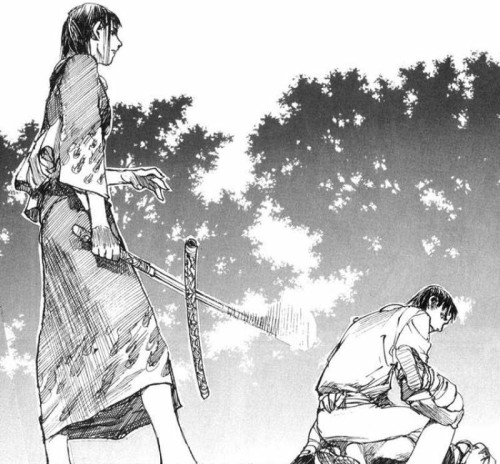“If you were stronger, I don’t know how this would have ended. But I know one thing. That woman would be dead. Those who gain power must pay a price, something in exchange. If you seek to be stronger than others you may have to lose what you value above all else. Remember this well.” –Giichi, Blade of the Immortal
In Blade of the Immortal, being strong means everything. When Rin loses her parents, looking on as they are humiliated and butchered right in front of her, she vows to avenge them, but talk is cheap. When your enemy’s strong, you’ll need to be that much stronger, but what does it mean to be strong, anyway? If it weren’t for what happened to Rin’s parents, she’d have just been another normal kid. Timid, likes sweets, curious about boys. Instead, she’s now walking this dangerous road with Manji.
Manji’s strong, but he’s also covered with scars and has one eye. Oh, and he’s immortal, too. Being strong, then, carries with it a physical burden? Not always, Rin’s target, Anotsu, is the leader of the feared Ittō-ryū, but has nary a scratch. At the very least, though, you must be prepared to injure yourself in pursuit of your ambition, but that doesn’t mean one should rush to likely defeat. They say that luck favours the brave, but if you ask me, that’s just another excuse for stupidity. Luck favours the one still standing, and it’s not cowardly to know when you’re beaten.
So far, I’ve read up to chapter thirty-one of this story and Rin’s still weak. Or rather, she’s still young, and what her vengeance entails is not as clear as first thought. Certainly, in the world of samurai and its romanticisation of murder and cruelty, the reality of strength in an era of swords is pretty damn harsh. But the point is, if you aren’t willing to dirty your hands, you may as well stop now. To get to Anotsu, Rin must be prepared to sail down a river of blood.
Therefore, being strong means accepting that others may suffer, too? In the Heart of Darkness story arc, Rin and Manji join forces with the Mugai-ryū, another group hell bent on bringing down Anotsu and his Ittō-ryū, but while Rin and Manji retain a moral code, the Mugai-ryū (and one guy in particular) are far less scrupulous. Could you abide by the torture of your enemy? They tortured Rin’s parents to death, after all, and if being strong means having the courage of your convictions, are you weak if you’re unwilling to see your enemies die like this, screaming in pain?
“…And when I watched how you fought just now, I felt like throwing up. But, somehow, I felt like you were teaching me something I lacked, too. But now, seeing this. At last, I know. I was completely wrong! I’ve been trying hard, trying to think of you, Shira, as my comrade-in-arms, but the truth is I despise people like you. Stripping and torturing an unarmed woman! You enjoy that?! You’re just the same! The same as the Ittō-ryū bastards I hate!” –Rin, Blade of the Immortal
Shira fights with a saw blade, all the better to torture them with. At the point that Rin stops him, he’s about to a rape a geisha involved with the Ittō-ryū. He’d already chopped off her foot and lacerated one of her breasts. He’s supposed to be on her side, and she has no chance of stopping him, but right there and then, she knew what she had to do. Therein lays her potential for strength, I think. This was a brave thing to do.

In a world of complexity and contradiction, those who appear strong are those who know, without question, what they want in life. Realising that with any conviction isn’t easy, but we all have to start somewhere. Rin thinks she wants vengeance, but underneath it all, I’m still not convinced, and that she wavers is why she’s still not strong enough to face a person as fiercely ambitious as Anotsu. To be continued, I suspect.
(Oh god, what a circular mess, and a testament to the moral labyrinth that is Blade of the Immortal. I’m lost and can’t stop reading, please send help. And caffeine.)

Leave a Reply